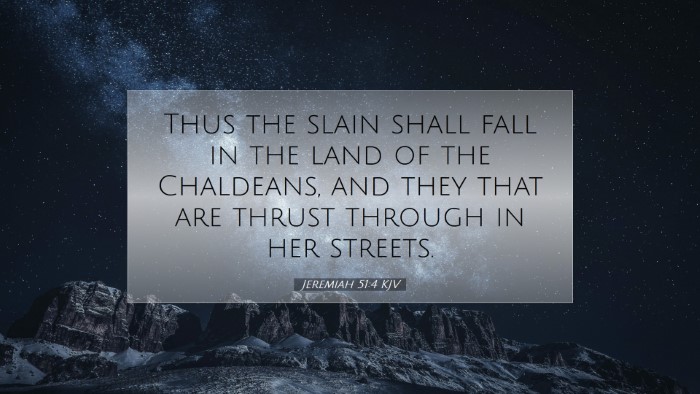Bible Commentary on Jeremiah 51:4
Introduction
This commentary will explore Jeremiah 51:4, which states, “And they shall fall down slain in the land of the Chaldeans, and thrust through in their streets.” This verse is a part of the prophetic judgment against Babylon, a major theme within the Book of Jeremiah. The verse provides a vivid depiction of the impending destruction that will befall the Chaldean empire, known for its pride and idolatry.
Contextual Understanding
To fully appreciate the weight of Jeremiah 51:4, it is important to consider its contextual backdrop. This prophecy comes at a time where God is expressing His judgment against Babylon, which had not only oppressed Israel but had also turned to idolatry. The chapter outlines a broader context of divine retribution, with Babylon’s sins leading to a fate of desolation and destruction.
Insights from Public Domain Commentaries
Matthew Henry's Commentary
Matthew Henry emphasizes the certainty of God’s judgment against Babylon. He notes that the phrase “fall down slain” implies both a literal and symbolic downfall. Babylon, despite its strength, will face an undeniable defeat as ordained by the Lord. Henry highlights that the streets, once bustling with commerce and wickedness, will become scenes of desolation and death, serving as a solemn testament to the consequences of sin.
Albert Barnes' Notes on the Bible
Albert Barnes provides valuable insights relating to the implications of this verse on both Babylon and the people of Israel. He interprets the “land of the Chaldeans” as a direct reference to the heart of Babylonian territory, where their fall from power will be most pronounced. Barnes contemplates the spiritual significance of such destruction, noting that it serves as a warning to nations that engage in idolatry and oppression. He also mentions the implications for Israel, signifying a turn toward restoration and hope amidst their hardships.
Adam Clarke's Commentary
Adam Clarke elucidates on the details of the prophecy presented in this verse. He highlights that this was not merely a military defeat but a comprehensive judgment involving God’s maximum intensity against Babylon's iniquities. Clarke points out the stark imagery of being “thrust through in their streets,” which illustrates the swift and untimely demise that awaits those who defy the Almighty. He notes that this destruction is preordained and serves a dual purpose: to execute justice against evil and to reaffirm God’s sovereignty over all nations.
Theological Reflections
This verse raises significant theological reflections that are crucial for pastors and theologians today:
- Divine Justice: It underscores the principle of divine justice, where God’s holiness demands righteous acts against unrighteous nations.
- Hope for the Oppressed: For the people of Israel, this prophecy acts as a beacon of hope. Despite their suffering, God’s promise of justice offers reassurance of eventual redemption.
- Idolatry and Its Consequences: Babylon serves as a prototype of earthly kingdoms that pursue idolatry and pride. The consequences displayed here remind believers of the ultimate futility of turning away from God.
- God’s Sovereignty: At the core of this judgment is the affirmation of God’s sovereignty over nations. He rises against those who oppose Him and will always act for His glory.
Application for Today
In light of Jeremiah 51:4, modern believers can glean important lessons for application:
- Confidence in God's Justice: Believers can find comfort in knowing that God sees the injustice and will act in His perfect timing.
- A Call to Repentance: This passage serves as a call for individual and communal repentance from idolatry and sinful practices, urging believers to align their lives with God’s will.
- The Importance of Spiritual Vigilance: The fall of Babylon serves as a reminder to remain spiritually vigilant against the seductions of modern-day idolatry.
- Encouragement for Ministry: For pastors and leaders, this commentary emphasizes the need to preach the truth about God's judgment alongside His mercy, reminding congregations of the full character of God.
Conclusion
Jeremiah 51:4 serves as a significant prophetic statement about the fall of Babylon and God's enduring nature as a righteous judge. Insights drawn from public domain commentaries by Matthew Henry, Albert Barnes, and Adam Clarke deepen our understanding of this text and encourage believers to reflect on its implications for faith and practice today. As God’s judgment was unequivocally executed on the proud kingdom of Babylon, let today's believers ponder the necessity of humility and fidelity to the Lord.


